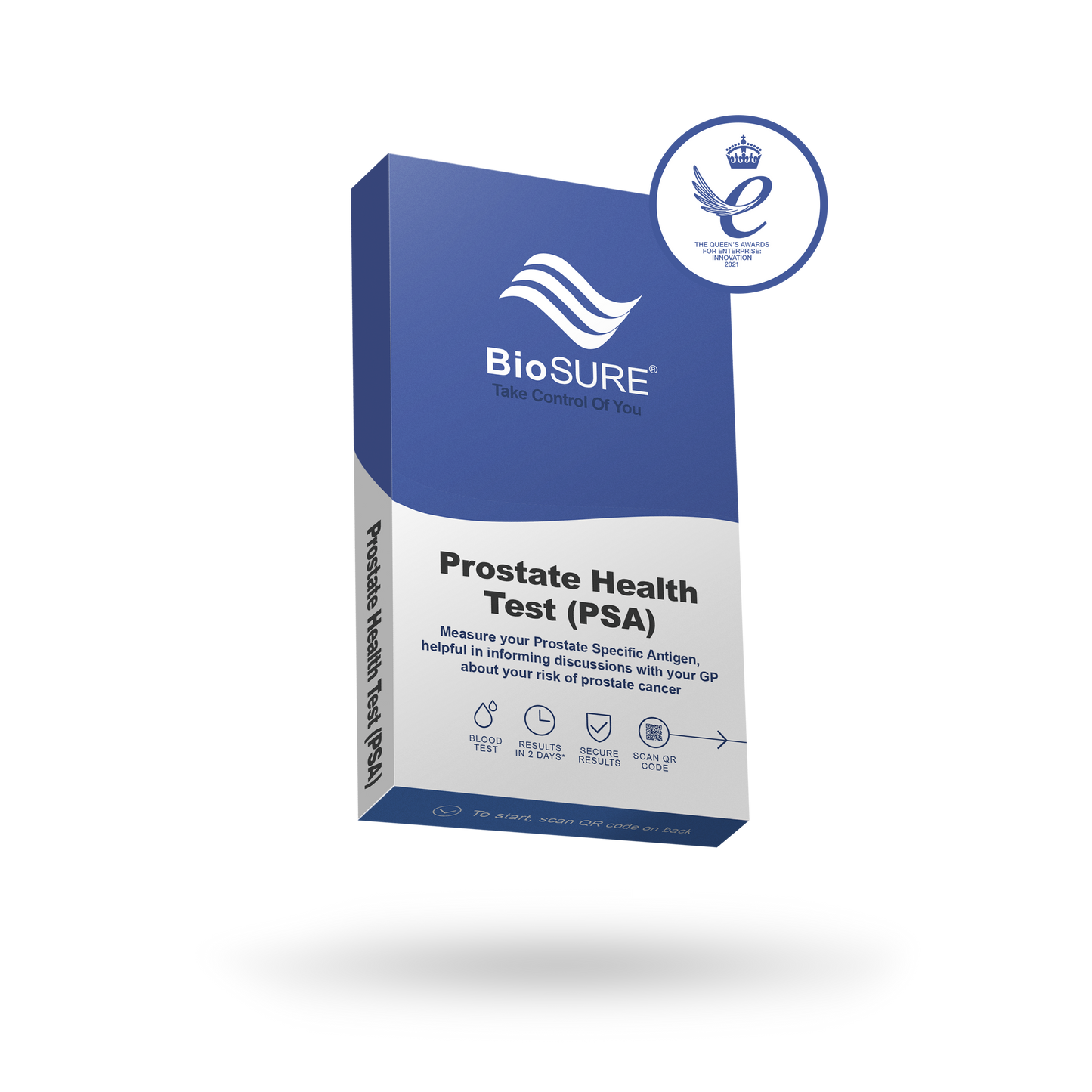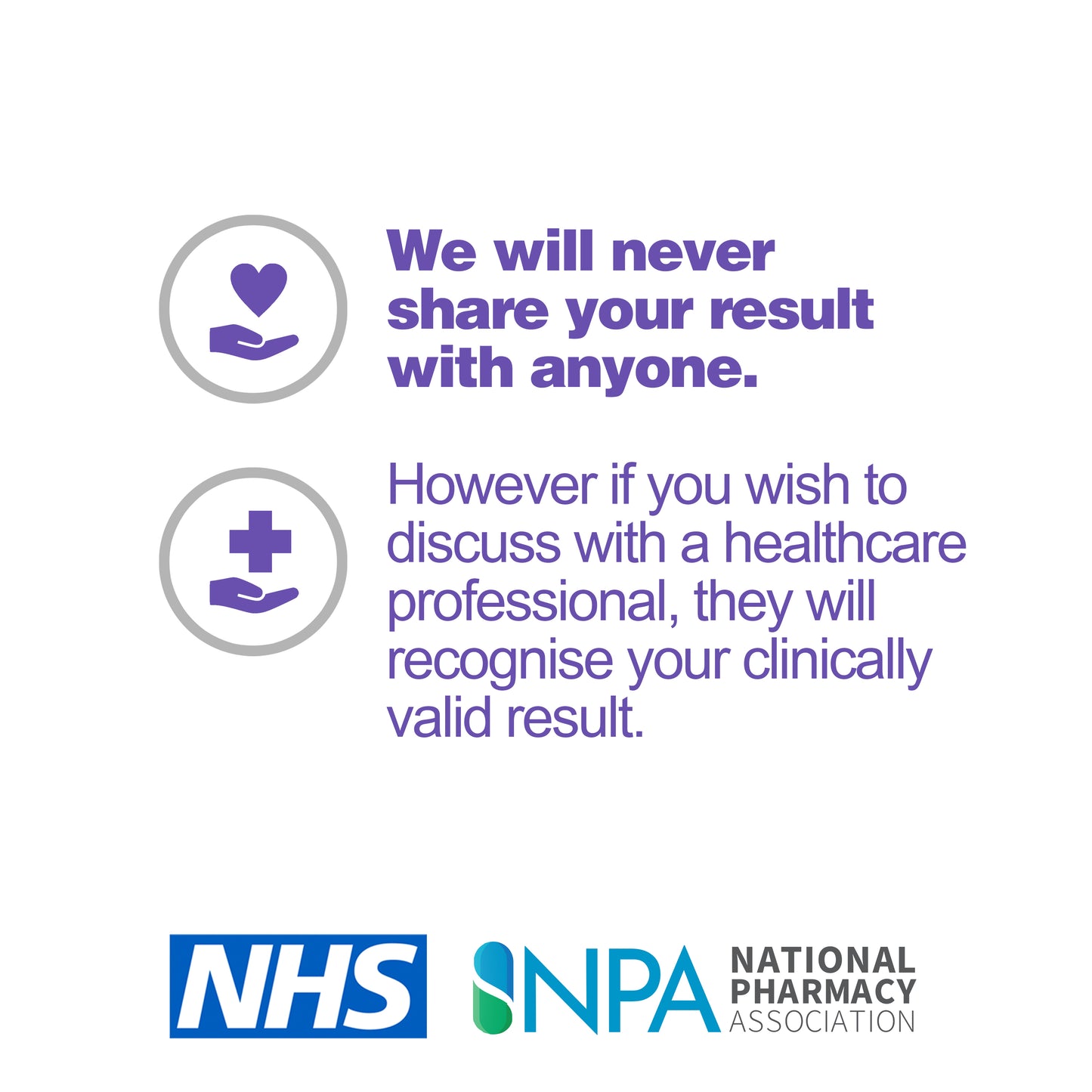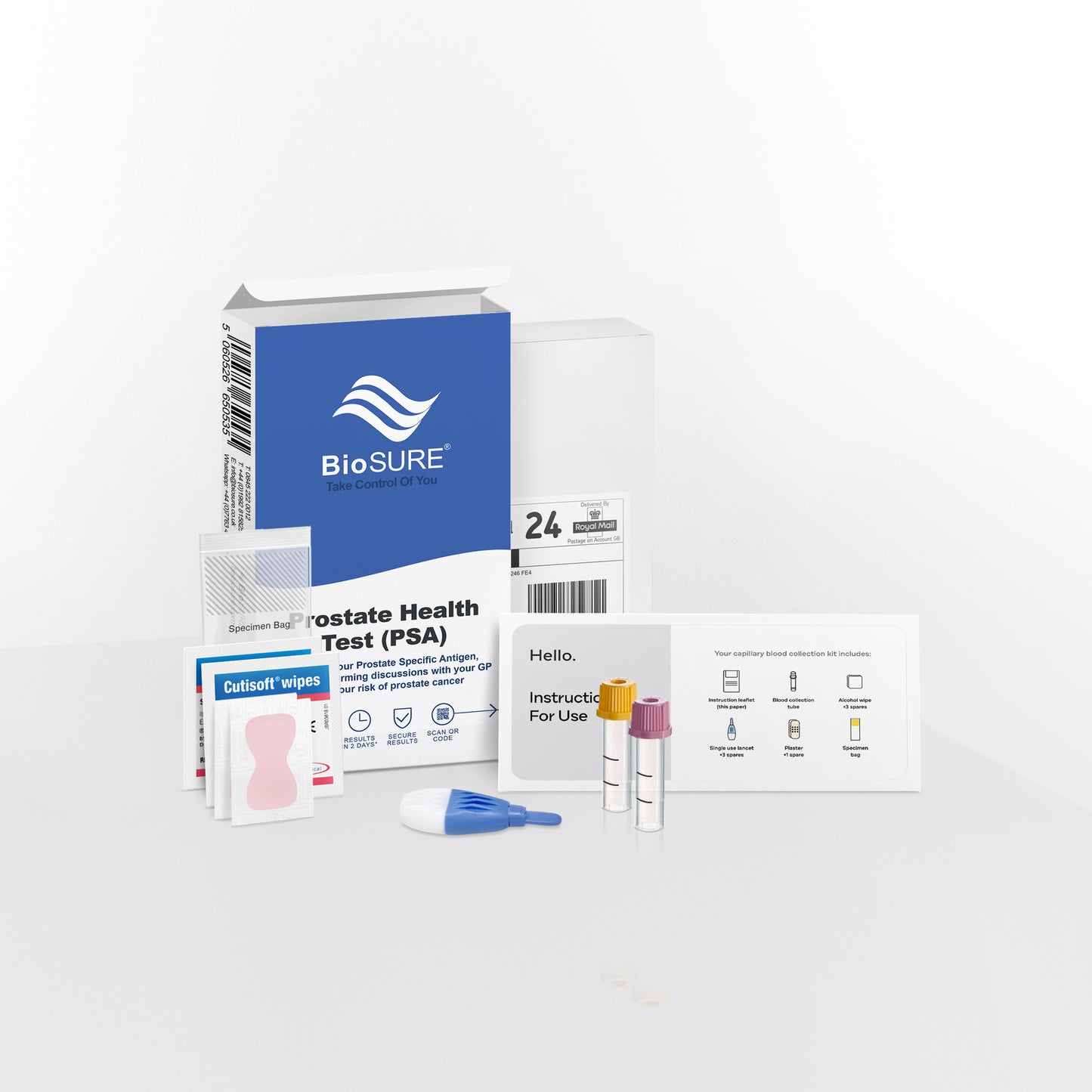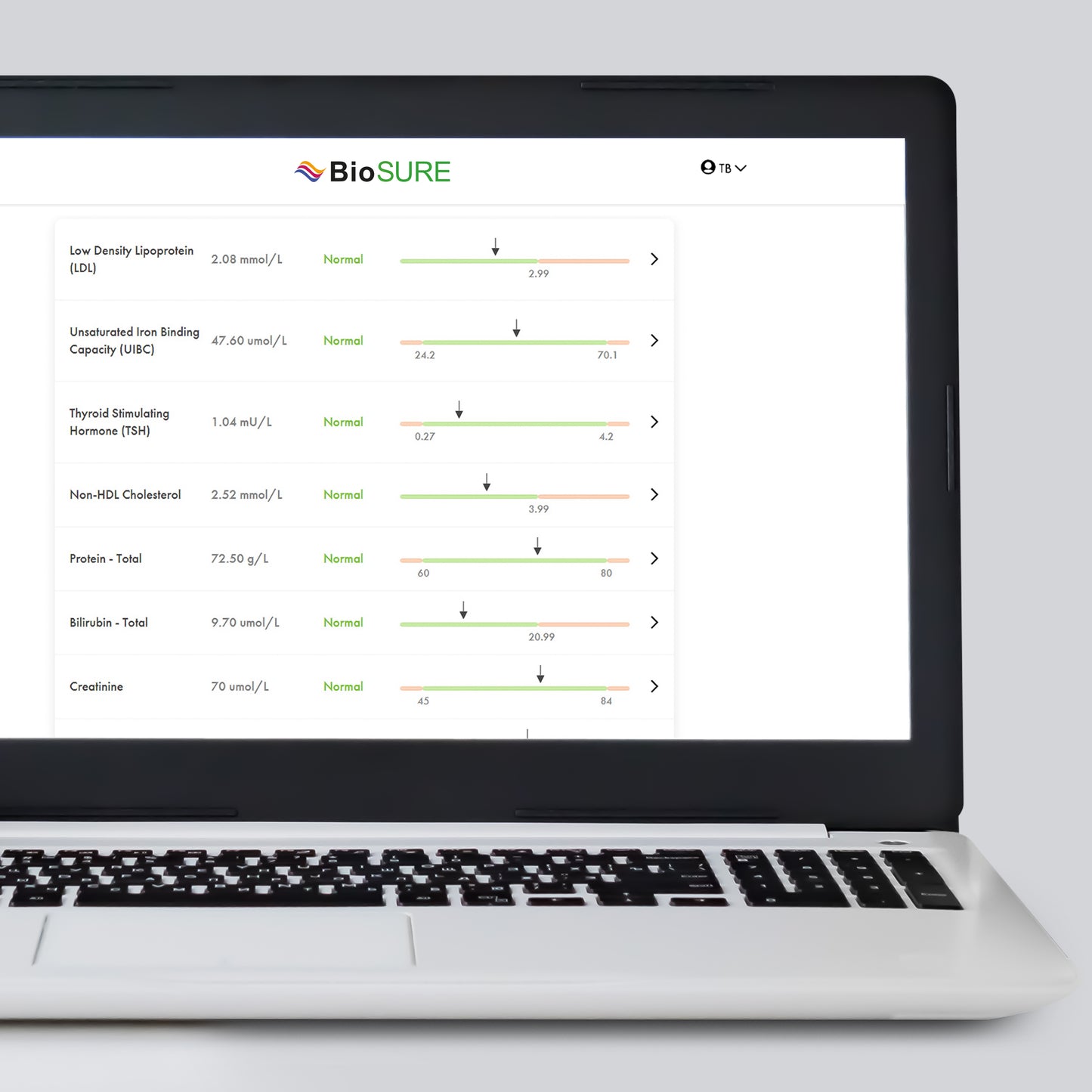BioSURE Prostate (PSA) Test
BioSURE Prostate (PSA) Test
Measure your Prostate Specific Antigen (PSA) level for an indication of your risk for prostate cancer.
Couldn't load pickup availability
Total Prostate Specific Antigen
Fingerprick Blood Sample
Lab Test - results within 48 hours
Free Two Way Delivery Included
Why check your PSA levels?
Understanding your level of risk of prostate cancer means you can make informed decisions to make positive changes to your lifestyle and behaviours to lower your risk.
View full details



The BioSURE Prostate Health Test measures your level of Prostate Specific Antigen (PSA) in your blood.
PSA is a protein that is produced in the prostate gland and is widely used as an indicator of the possibility of prostate cancer. Screening for prostate cancer usually also involves a physical examination.
Many things can alter the level of PSA in your blood, but your result is useful for discussions with your doctor.
A negative PSA test does not rule out the possibility of prostate cancer, so you should speak to your doctor immediately if you have any relevant symptoms such as back pain, erectile dysfunction, difficulty starting urinating, poor or intermittent urine flow, dribbling after urinating, urinating more at night, blood in your urine or semen and/or pain during urination or erection.
A positive PSA test does not mean that you definitely have prostate cancer, but you should seek an urgent medical review if you do receive a positive test, for a full assessment of your prostate and overall health.
About 1 in 8 men in the UK are diagnosed with prostate cancer in their lifetime. PSA screening may help you detect prostate cancer early.
Some prostate cancers are slow growing and do not spread, some do not even need treatment. If treatment is required, then earlier diagnosis gives more treatment options, better health outcomes and is more likely to be cured.
It is normal to have a small amount of PSA in your blood, but as you get older, the levels can increase because your prostate gets larger.
The main reasons for increased risk of prostate cancer are getting older (it mainly affects men aged 50 and older) and having a family history. Ethnicity can also have an impact.
If you notice changes and find you are urinating or feeling you need to urinate more frequently (especially in the night) then it can be worth considering testing, although other conditions can cause this.
Some men like to test regularly every year or so if they know they have an increased risk of prostate cancer.
This test measures the Total Prostate Specific Antigen.
PSA is a protein produced in your prostate gland and the level of PSA in the blood is often elevated in people with prostate cancer, which is why it is used as part of an assessment of risk and diagnosis.
No, you do not need to fast for this test, but it is recommended that you take your sample first thing in the morning.
PSA is a protein made by the cells in your prostate gland. It is made by healthy cells, but it is also made by malignant cells which is why an increased PSA level may be a sign of prostate cancer.
It is normal for PSA levels to go up as you get older as your prostate gets larger.
There are lots of reasons you may have an increased level of PSA in your blood, some medical, some not.
Medical reasons can include a urinary tract infection (UTI) or a urinary tract irritation and there are some medications that can affect your PSA levels (please see the bullet point above 'Is there any reason for me not to have a PSA test). A recent prostate (rectal) examination and also having a catheter can also increase PSA levels.
Non-medical reasons include exercise, cycling, masturbating and sexual activity.
A PSA test cannot alone diagnose whether you have prostate cancer or prostate related problems. Many men with raised levels of PSA do not have prostate cancer. And normal levels of PSA also does not rule out prostate cancer.
This self test will give you an indication of your PSA level, which you can use to speak to your doctor about.
If you have lower levels of PSA, it is recommended that you get in contact with your GP to discuss your options but there are simple lifestyle changes you can make to decrease your risk of prostate cancer.
PSA tests are used to look for possible signs of prostate cancer but cannot diagnose if you have cancer.
If your result comes back as normal levels, this means that your PSA levels are below the cut off point and suggests that you are at a lower risk of developing prostate cancer.
Having normal or low PSA levels does not rule out the possibility of prostate cancer, so you should speak to your doctor immediately if you have any relevant symptoms such as:
- unexplained back pain
- erectile dysfunction
- difficulty starting urinating
- poor or intermittent urine flow
- dribbling after urinating
- urinating more at night,
- blood in your urine or semen and/or pain during urination or erection
A raised level of PSA suggests that you may have a problem with your prostate but does not mean that you do have prostate cancer. You should seek an urgent medical review if you do have high levels. Your doctor will recognise your results and is likely to perform more tests, including a physical examination to fullly assess your prostate and overall health.
There are many reasons your PSA levels may be increased even if you don't have prostate cancer. These include masturbation, sexual activity (especially anal intercourse), high levels of exercise and cycling.
Prostate cancer does not usually cause symptoms until it has grown big enough to put pressure onto your urethra, (the tube that carries urine from your bladder out through your penis).
Symptoms of prostate cancer can include:
- needing to urinate more frequently, especially during the night
- needing to rush to the toilet
- difficulty in starting to wee
- straining or taking a long time to urinate
- weak urine flow
- feeling that your bladder has not fully emptied
- blood in your urine or semen
These symptoms do not always mean you have prostate cancer.
Your prostate gets larger with age and can also can increase in size because of a non-cancerous condition called benign prostate enlargement.
- Age - as you get older, your risk of prostate cancer increases. Those aged 50 and above are considered at higher risk.
- Family history - if a close family member on your paternal side has been previously diagnosed with prostate cancer before the age of 65, your risk is higher.
- Race - those of black ethnic origin are at an increased risk of prostate cancer, for reasons that are still fairly unknown.
- Diet and lifestyle choices - if your diet is high in animal fats, you may be at an increased risk of getting prostate cancer later in life.
Lifestyle choices play the largest role in affecting PSA levels, so changing your diet and exercise routines can naturally bring down your PSA levels, leading to better prostate health, and benefit your overall health.
Losing Excess Weight - cancer (not just prostate cancer) is more common in overweight and obese people and studies have shown that obesity can also increase the aggressiveness of cancers.
Small changes that you can make to your diet to lower your PSA levels include
- Eat more tomatoes - in addition to containing antioxidants that might protect against cancer, they contain lycoprene which researchers have shown can help lower PSA levels.
- Drink green tea - it's full of antioxidants and in Asian countries where men drink large amounts of green tea, they have some of the lowest prostate cancer rates in the world.
- Take Vitamin D - not having enough vitamin D has been linked to a higher risk of having prostate cancer and research has also shown that people with higher levels of vitamin D have lower PSA levels.
Increasing Exercise - exercise is always linked to an increase in quality of life, so incorporating daily exercise into your routine is always a good idea, but a study from Harvard School of Public Health has demonstrated that men who engaged in “long-term vigorous exercise” had a “30% lower risk of developing advanced prostate cancer and 25% lower risk of developing lethal prostate cancer” than those who did not.
Free two-way shipping is included
Standard DPD delivery to you is included in the price and your kit also includes a Royal Mail 1st Class Tracked label for you to send your sample back.
All orders received by 2pm are shipped the same day. Orders received after 2pm on a Friday will be shipped the next working day.
A kit containing everything you need is sent to an address of your choice.
You can then take a simple finger prick sample, using the lancets provided and collect the drops into the tube. You then register it on-line and post it off to the laboratory using the Royal Mail 1st Class Tracked envelope that is included with your kit.
Your full report, showing your results and how they compare with the normal reference ranges, are reported back to you by email. You will receive your result the day after the lab receives your sample.
All test results are reviewed by the in-house GPs who highlight any areas of concern of that might need further investigation and follow up with a doctor.
No, you do not need to fast for this test, but it is recommended that you take your sample first thing in the morning and post it back the same day.
Yes, your healthcare provider will recognise your clinically-valid results.
This test is not intended for diagnosis of prostate cancer, but determines the levels of total PSA in your blood. If your result is high, it is important to share these results with your doctor who will consider them in conjunction with your full medical and family history. Your doctor may also request further follow on tests after you share your results.
Early diagnosis is key to managing any health condition and means an increased range of treatment options, improved long-term health and improved quality of life.
It is unlikely to gain a definitive diagnosis from a blood-test but your results can be used to have informed discussions with your healthcare provider.
There are many reasons PSA levels can be affected including exercise, cycling, masturbating, sexual activity and rectal examination.
Your results link will be sent to you via email, so you can log in to your secure account and view your results.
Your results include your levels and where they sit against 'normal levels'. There is also a visual interpretation as a colour coded graph so they are easy for you to understand.
Your blood sample will be processed in the laboratory within 24 hours of receipt on all working days. You will receive an email with a secure link through to your account and your results as soon as they are availlable.
It is very important you scan your unique QR code when you open your kit, as this is what links your sample and your result to you. Without this we won't be able to send you your result.
Yes, your samples are processed in the same laboratories that are used by hospitals and primary care providers. All of our partner labs are UKAS and ISO accredited, which are the highest levels of accreditation.
Your BioSURE Self Test kit contains -
- Instructions for Use
- Collection tube(s)
- Alcohol wipe x 2
- Lancet x 4
- Collection tube label(s)
- Pre-paid return packaging
We advise collecting your fingerprick blood sample in the morning, especially for tests that require fasting. Return on the same day in the pre-paid packaging that is supplied with your kit.
We also advise not collecting or returning your sample on Friday, Saturday or Sunday, so the lab receives it in the best possible condition.
Your GP is always a good person to speak with if you are worried about your personal risk of prostate cancer, but some people can find this embarassing.
Prostate Cancer UK are a wonderful organisation who have specialist nurses available to discuss any concerns.




